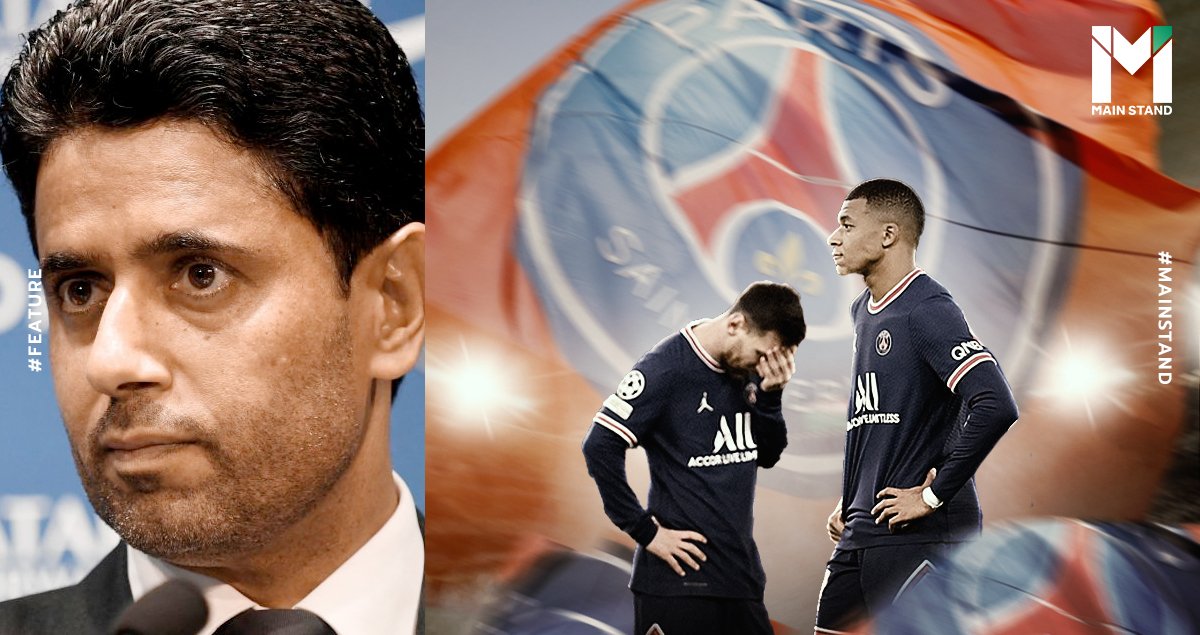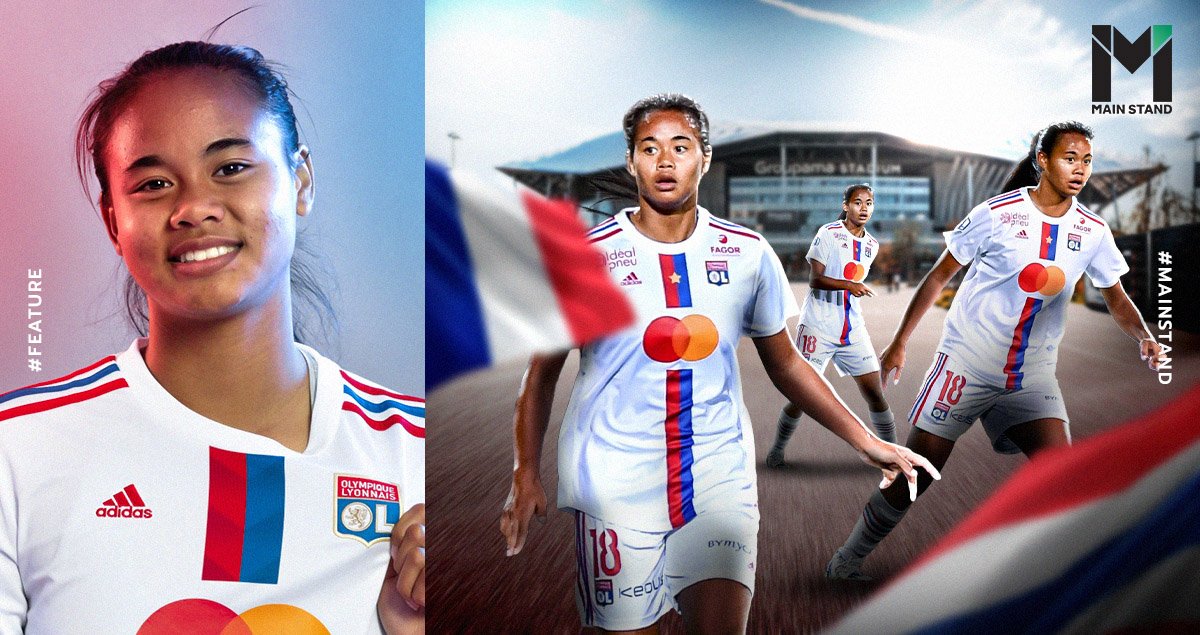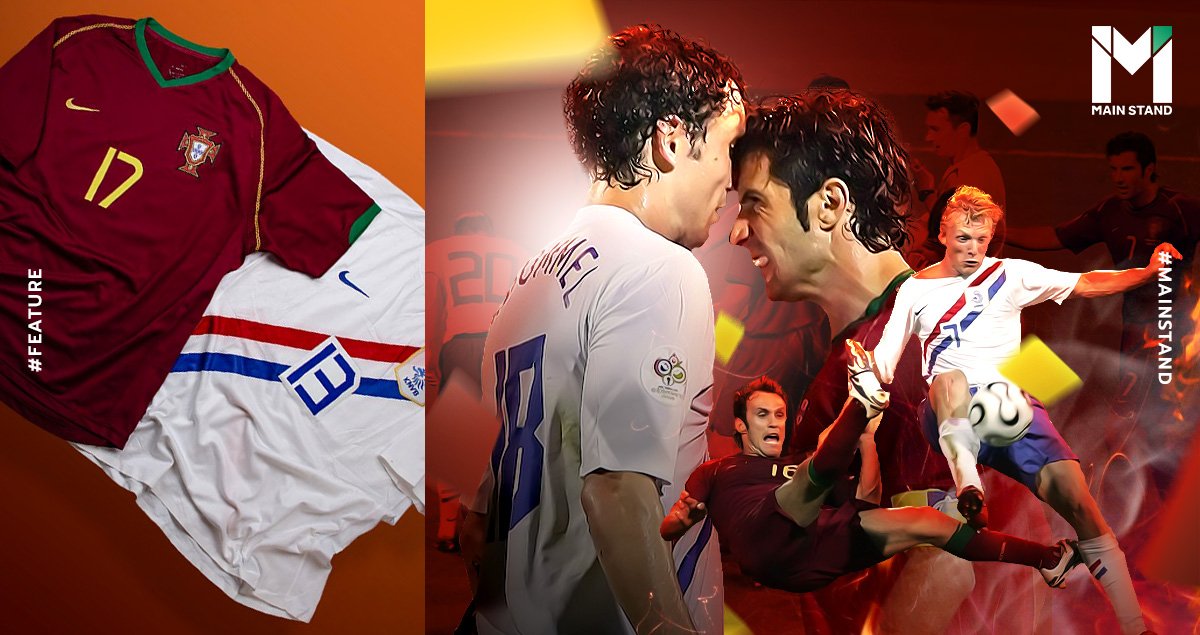
Football is a sport that aims to promote people's health, both physical and mental, like other sports. But, in reality, football is too brutal to be only a game.
The sport is associated with fame, honor, pride, and valuable financial rewards. So professional footballers, without a doubt, are competitive on the pitch.
And today, Main Stand presents you with a ruthless game, the Battle of Nuremberg, dubbed the most violent FIFA World Cup match by far.
Pitch perfect
The Battle of Nuremberg in the 2006 FIFA World Cup was named after the "Battle of Nuremberg" during World War II in April 1945 in Nuremberg.
The American army force battled against Nazi Germany and the Russian Liberation Army (ROA) to capture the city, a strategic military location during World War II.
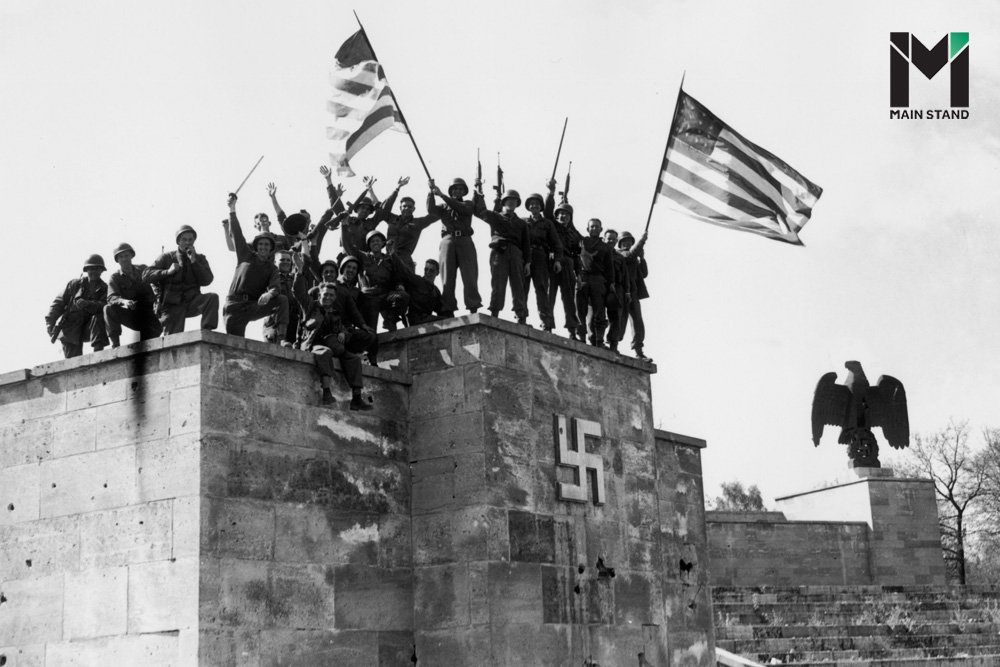
It took American forces around five days to successfully end the war and capture the city. The Nazi general was executed right before his soldiers during the five-day battle. And the American flag rose to the top at the Adolf Hitler Platz to show the war officially drew to a close shortly after the last stage of World War II in Europe.
The world compared the battle to the last 16 fixtures in the 2006 World Cup, which was the game between two predominant footballing countries, Portugal and the Netherlands, at the Frankenstadion, Nuremberg.
Indeed, these two nations were not footballing rivals or politically belligerent as they were too geographically far from one another to encroach upon each other militarily. (Back in the seventeenth century, Portugal and the Netherlands were too far from each other to employ football as a way of revenge.)
Still, the squads of these two sides teemed with several defiant players, which stirred up animosity despite no hatred in history.
The Portugal national football team was under Luiz Felipe Scolari, a Brazilian head coach. Unfortunately, he led the 2004 team to finish first runner-up, losing to Greece, although they outperformed and played as the host country because Portugal held the 2004 event.
The failure at that time equipped Portuguese players with "confidence" and "vindictiveness" as they believed in their squad's abilities to triumph over any team. Beyond that, Luís Figo was still playing for the team, and Cristiano Ronaldo was an up-and-coming footballer, which was a promising outlook for Portugal to secure the title.
On the contrary, "vindictiveness" is associated with guilty and hurt feelings as they could have won over Greece. They believed the World Cup would alleviate the pain in the previous two years, so Portugal had high expectations for the 2006 tournament.
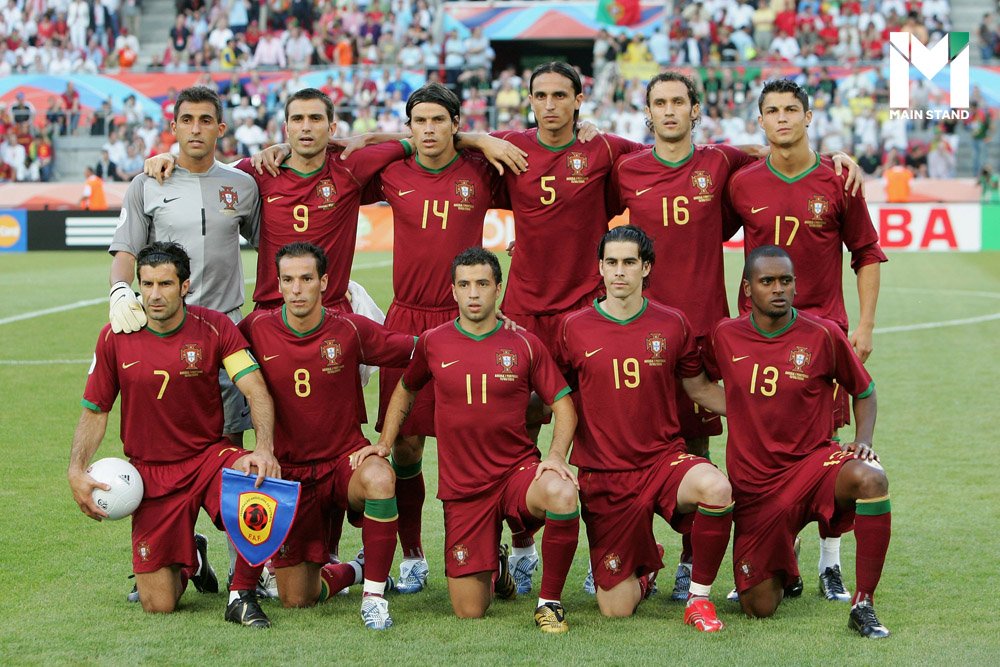
The Netherlands was a nation that had long been looking forward to success for the longest time. However, apart from the 1988 EURO victory, in which Marco van Basten was instrumental, the Netherlands had been in a drought of success. So the national team expected that they had to at least qualify for the semifinals.
Since the Portuguese team was full of passionate young players, they performed defiantly and brutally. Consider Ronaldo's playing style at that time. He often dribbled the ball into the dangerous area where the opponents were packed.
He liked to scythe through the opponents, not fearing getting hurt. On top of that, Portuguese players have inherited defiance from Jose Mourinho, who led Porto to clinch the 2004 UEFA Champions Leagues title.
Likewise, the Dutch team had notoriously ill-disciplined defensive midfielder Mark van Bommel, who always kicked and upset the opponents and Khalid Boulahrouz, a center back from Hamburg, who was infamous for the way he played defense.
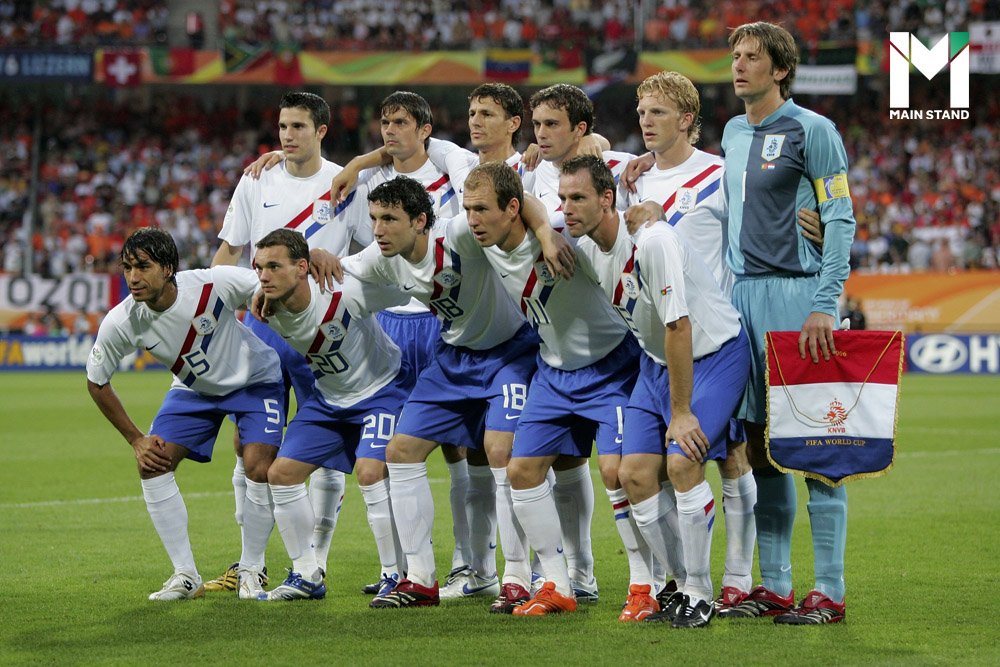
The heat of the game was not from both teams' preference for the fast-paced offensive game but also from Russian referee Valentin Ivanov, a hardline Russian referee. He handed out several red cards in the 2004 EURO in Portugal.
He issued 15 yellow cards and a single red card in only three games. A year later, again, he gave six red cards and 24 yellow cards in the World Cup qualifiers.
All those above combined made a small wood fuel awaiting oil added into it to blaze. And the fire eventually blazed in only two minutes after the 2006 Battle of Nuremberg kicked off.
What are you waiting for?
Ronaldo employed his speed to scythe through the Dutch defensive line in the second minute. If they did nothing to stop him, the Netherlands feared Ronaldo would play even more daringly and trouble their defensive players. With that, Van Bommel decided to tackle Ronaldo from behind.
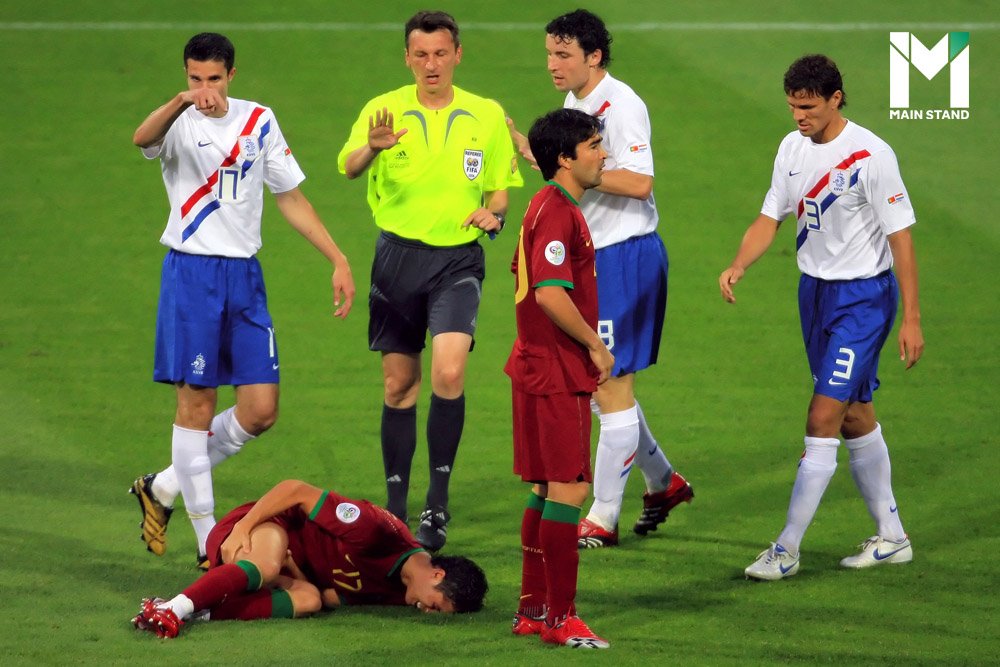
This misconduct marked the beginning of the duel. Ivanov issued the first yellow card for van Bommel to warn all the players that he could give them cards when they conceded any fouls.
But Ronaldo wanted to get even with the opposite. He kept getting on the rivals' nerves. Ronaldo was about to quickly counterattack in the sixth minute, winning the ball back in the air. However, Boulahrouz, known for purposely intercepting players instead of the ball, rushed to the goal area in a second and planted his studs on Ronaldo's thigh. The Portuguese fellow players told the referee it should have been a red card, but Ivanov awarded Boulahrouz only a yellow card.
As Portugal featured numerous young and bold players in the squad, they thought if their compatriot was fouled, the opponents deserved it too. Therefore, in the nineteenth minute, Portugal got their revenge on the Netherlands, thanks to a foul intentionally committed by midfielder Maniche.
He struck Van Bommel and yelled at him, "Oh, get up, Mark!" He was undoubtedly booked a yellow card for unsporting behavior, which was the third card of the game.
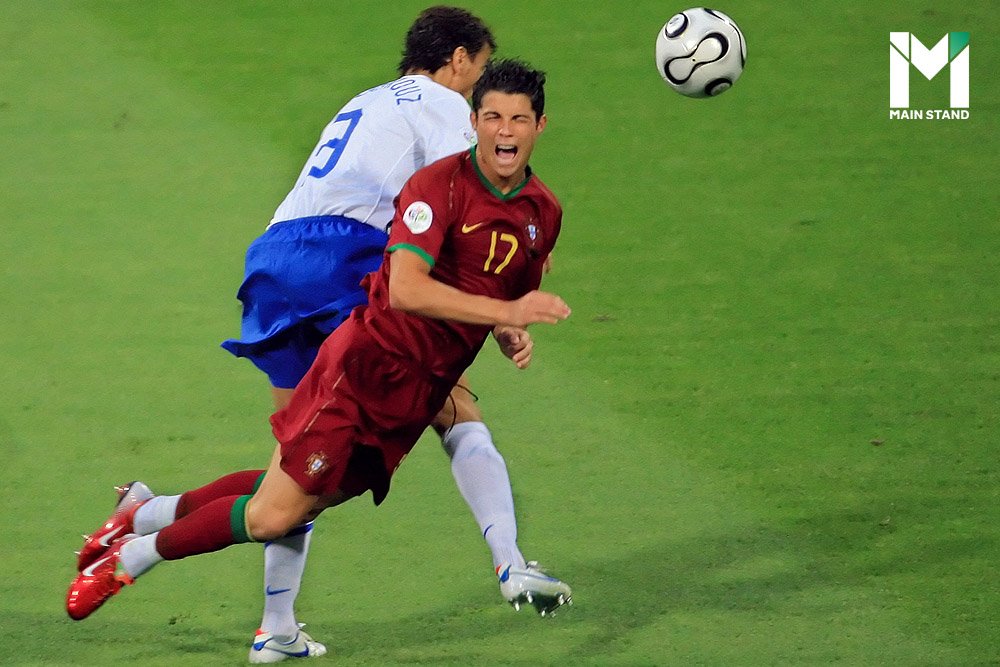
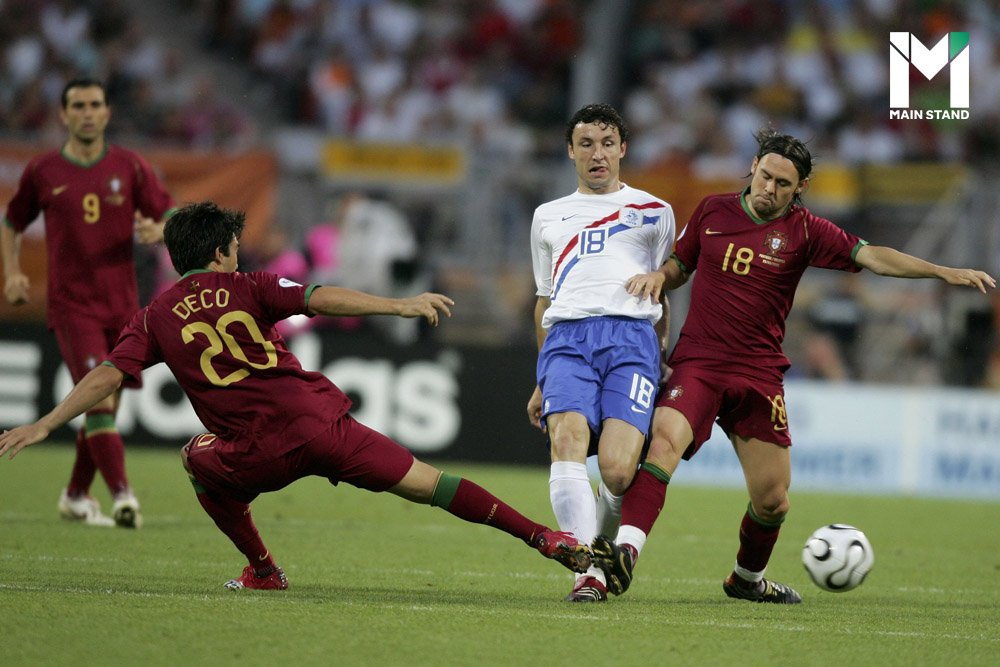
Four minutes after Maniche fouled van Bommel in revenge for Ronaldo, he netted the first goal, and Portugal took the lead in the 23rd minute.
After the goal, the game officially became even more vehement. Finally, in the 30th minute, Dutch veteran midfielder Philip Cocu successfully dispossessed the ball and dribbled it to turn the defensive game into an offensive one.
He evaded a Portuguese opponent, but Portuguese defensive player Costinha didn't allow him to scythe through, fouling Cocu in the air, resulting in the fourth yellow card of the match.
Shortly before the first half ended, Costinha nonsensically stopped a Dutch counterattack with his hand. So he was cautioned for a second time and was sent off from the pitch.
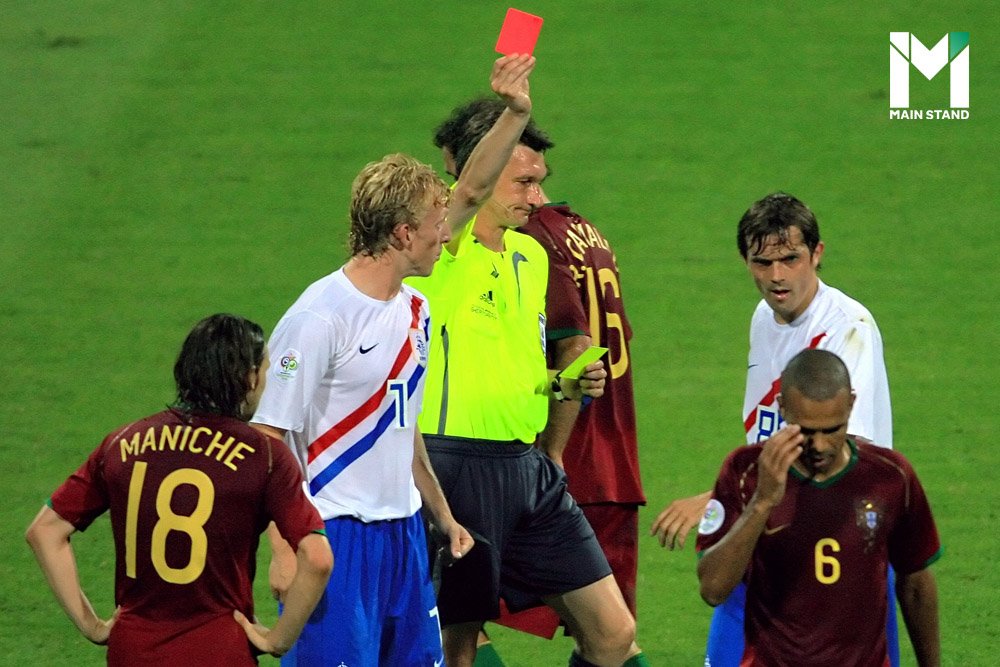
Midfielder Petit was sent onto the pitch in the second half to strengthen the defensive game.
He introduced himself to stop van Bommel's counterattack by charging into him intentionally. So Petit was booked the first yellow of the second half, accounting for the sixth yellow of the game.
In the 59th minute, Dutch left-back Giovanni van Bronckhorst made a mistake while trying to intercept the ball. As a result, the ball went to his team's penalty area, so he unhesitatingly jumped into Deco and was booked a yellow, the seventh yellow of the game.
While the referee was judging the roughhousing between van Bronckhorst and Deco, Luís Figo couldn't help but proceed to van Bommel, who repeatedly violated the rules and headbutted him. Sure enough, Figo earned a yellow card.
Henceforth, this football match was no longer only a game. Each player continually lunged at one other. Then, only a minute after Figo's headbutt on van Bommel, Boulahrouz elbowed Figo. The referee immediately presented a red card; each team had ten players equally.
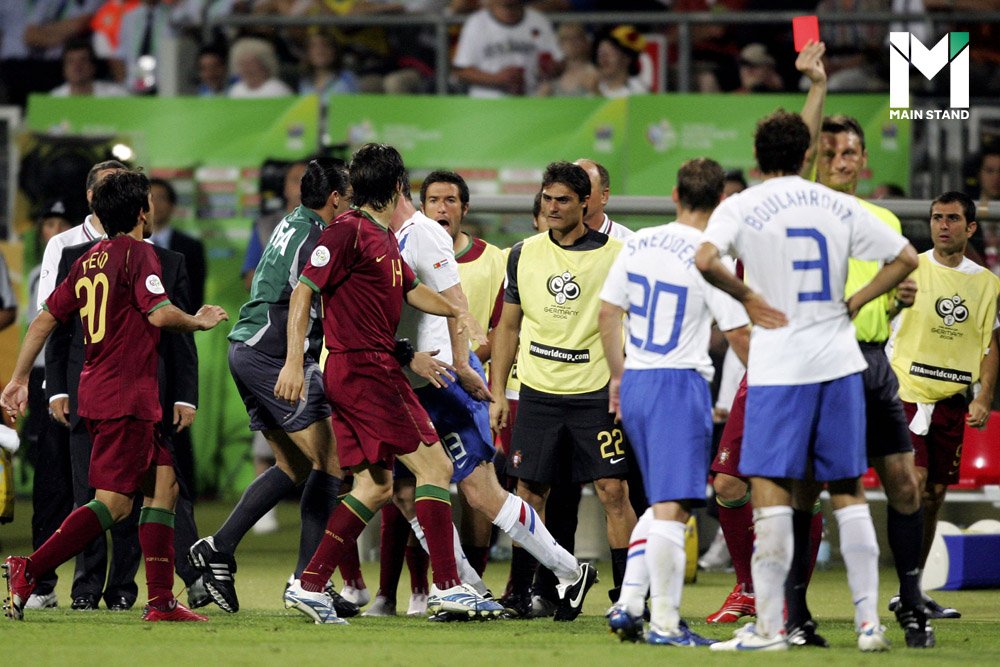
After that, 10 minutes into Boularouz's red card, Deco roughly fouled John Heitinga and was issued a yellow.
That foul provoked a fight between Wesley Sneijder and Deco. While pushing each other in the chest, another clash arose, between Rafael van der Vaart and Petit, mounting the number of yellows.
One minute after, Portuguese goalkeeper Ricardo was shown a yellow card for time-wasting, not restarting the game after the opponent shot a free kick outside the pitch.
After Ricardo was cautioned, he kicked the ball to the front. Dutchman Robin van Persie retrieved the ball to initiate a counterattack against Portugal. However, Portuguese left-back Nuno Valente quickly charged into Van Persie in the ankle from behind and was shown a yellow card.
The Netherlands were given a set piece in the last two minutes and rushed to score an equalizer, but they failed to pick up the pace to go on the game as Deco caught the ball and didn't allow van Bommel to take the set piece.
Deco's intention to delay the game booked him the second yellow card, accounting for a third of the match.
As the second half ended, no more clashes seemed to occur.
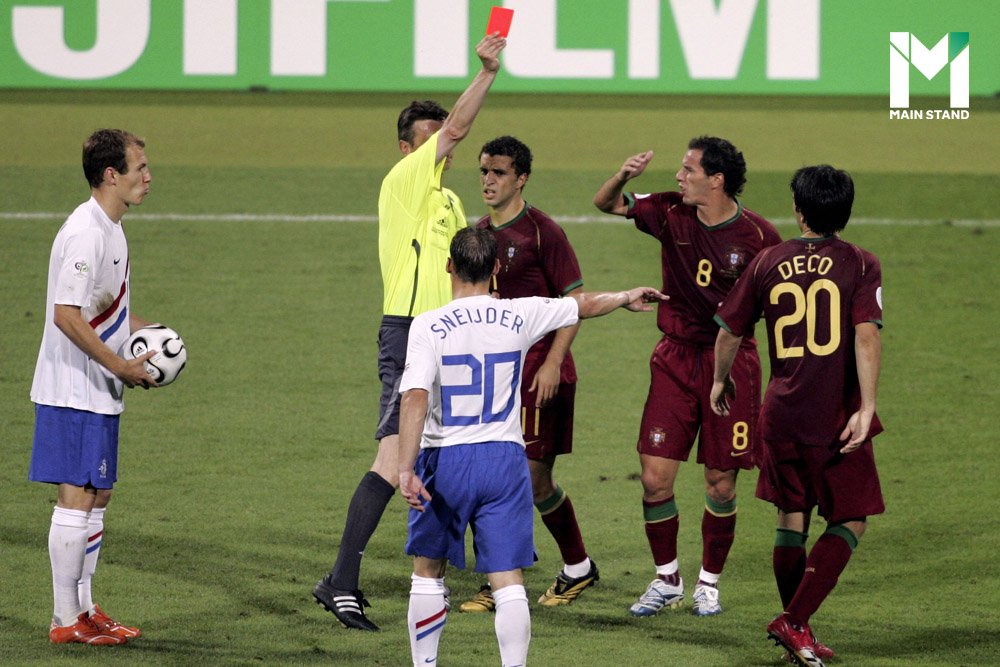
However, during the four-minute added time, van Bronckhorst tackled Tiago Mendes, attempting to gain possession of the ball to delay the game. As a result, Van Bronckhorst earned a second yellow and was sent marching.
The 2006 Battle of Nuremberg ended with 16 yellow and four red cards. There were pauses every two minutes throughout the 90-minute playtime. The Battle of Nuremberg was incomparable, albeit scandalous, with the most disciplinary sanctions in this tournament.
Those who witnessed how vehement the match was would provide you with the answer of "why the game was so cutthroat" when they simmered down, and their wrath was already gone.
The aftermath of the match
A few hours after the 2006 Battle of Nuremberg, FIFA president Sepp Blatter was dissatisfied with the game and gave a press interview, blaming footballers for lacking sportsmanship and rife indiscipline throughout the playing time frame.
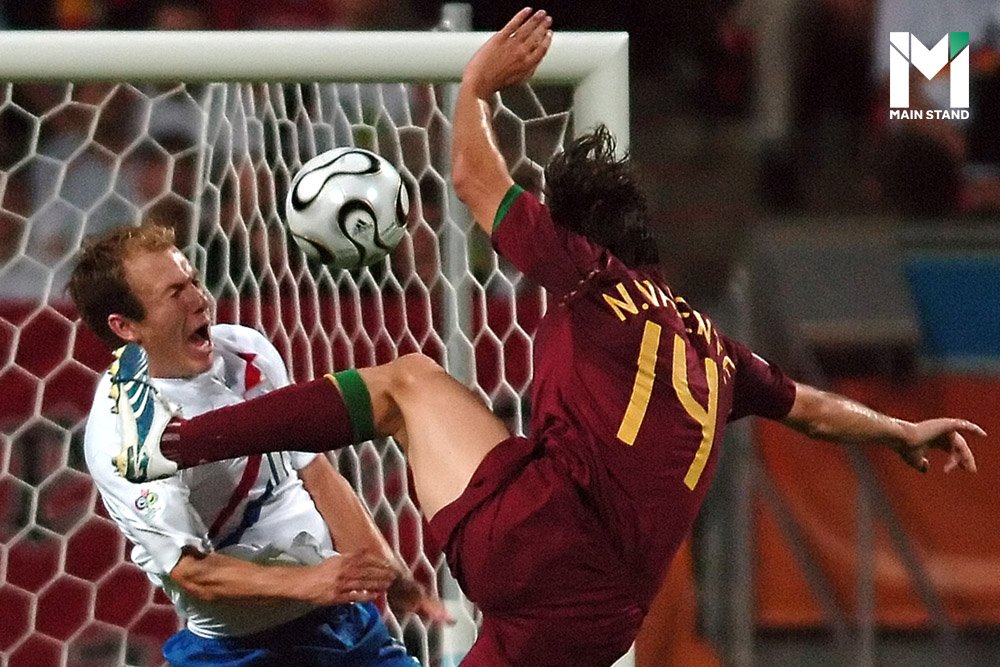
However, how onlookers viewed, it differed from what Blatter said. They regarded the way Ivanov issued yellow cards as an act of stirring up the game, not caution against the players not to go against the rules.
Exemplified by Boulahrouz's foul by stepping on Ronaldo's foot, it was evident that he meant to harm the opposite player despite no VAR decision physically. But Ivanov showed him only a yellow card, not to mention Luís Figo's headbutting, which deserved a red card.
Ivanov let the two teams furiously encounter one another, with unbearably much resentment accumulated. If there had been VAR decisions back then, decisions would have been better.
A day after the interview, Blatter realized the criticism he was bombarded with.
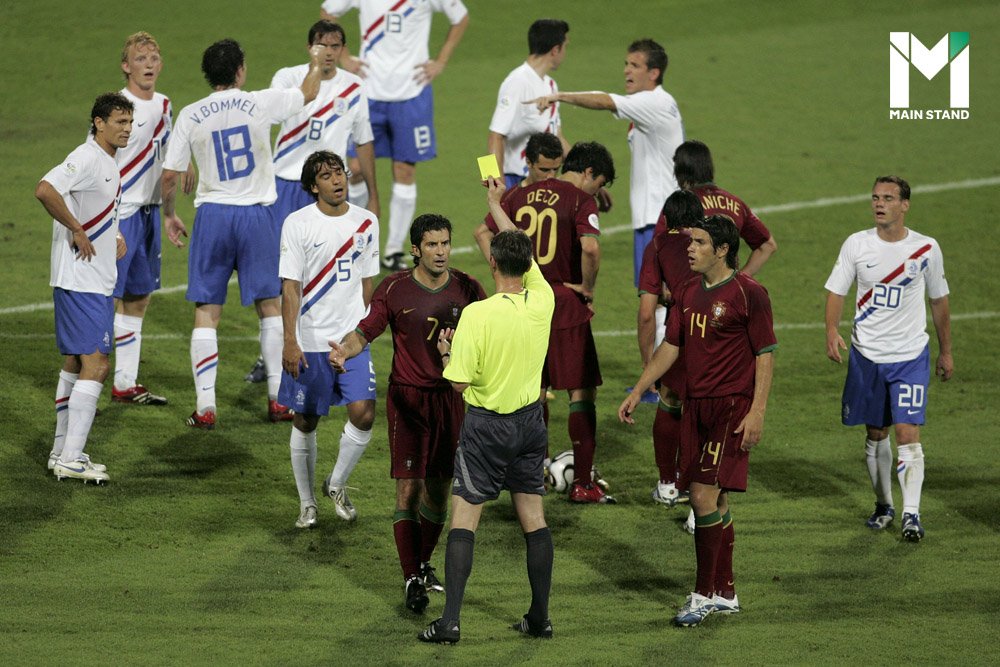
He admitted he was wrong for blaming the players solely for wreaking the night's havoc, overlooking the referee's discretion. As a way out, Blatter announced Ivanov would no longer officiate in the remainder of the World Cup games.
Regardless, all played a part in causing the 2006 Battle of Nuremberg.
Despite the notoriety, this game prompted FIFA to utilize technology to judge the results and revise the footballing rules because of more seamless games.
For instance, players can leave the field anywhere, not needing to head to the bench. This rule was revised to prevent players from delaying the game through delayed walking to the court, which could upset the team behind and fuel their anger.
All the revised regulations, application of technology, and stricter fouling rules and regulations have significantly changed football games, so there are no more dirty plays where the focus is on the opponents instead of the ball.
So the 2006 Battle of Nuremberg was not only known as the roughest World Cup game rife with cards due to persistent horrendous fouls, but it also contributed to stricter rules and regulations in today's game.
Sources:
https://historyofsoccer.info/battle-of-nuremberg
https://thesefootballtimes.co/2016/09/16/the-battle-of-nuremberg-at-world-cup-2006/
https://www.planetfootball.com/nostalgia/a-forensic-analysis-of-all-20-cards-shown-during-the-battle-of-nuremberg/
https://en.wikipedia.org/wiki/Battle_of_Nuremberg_(2006_FIFA_World_Cup)
https://en.wikipedia.org/wiki/Valentin_Ivanov_(footballer,_born_1961)





